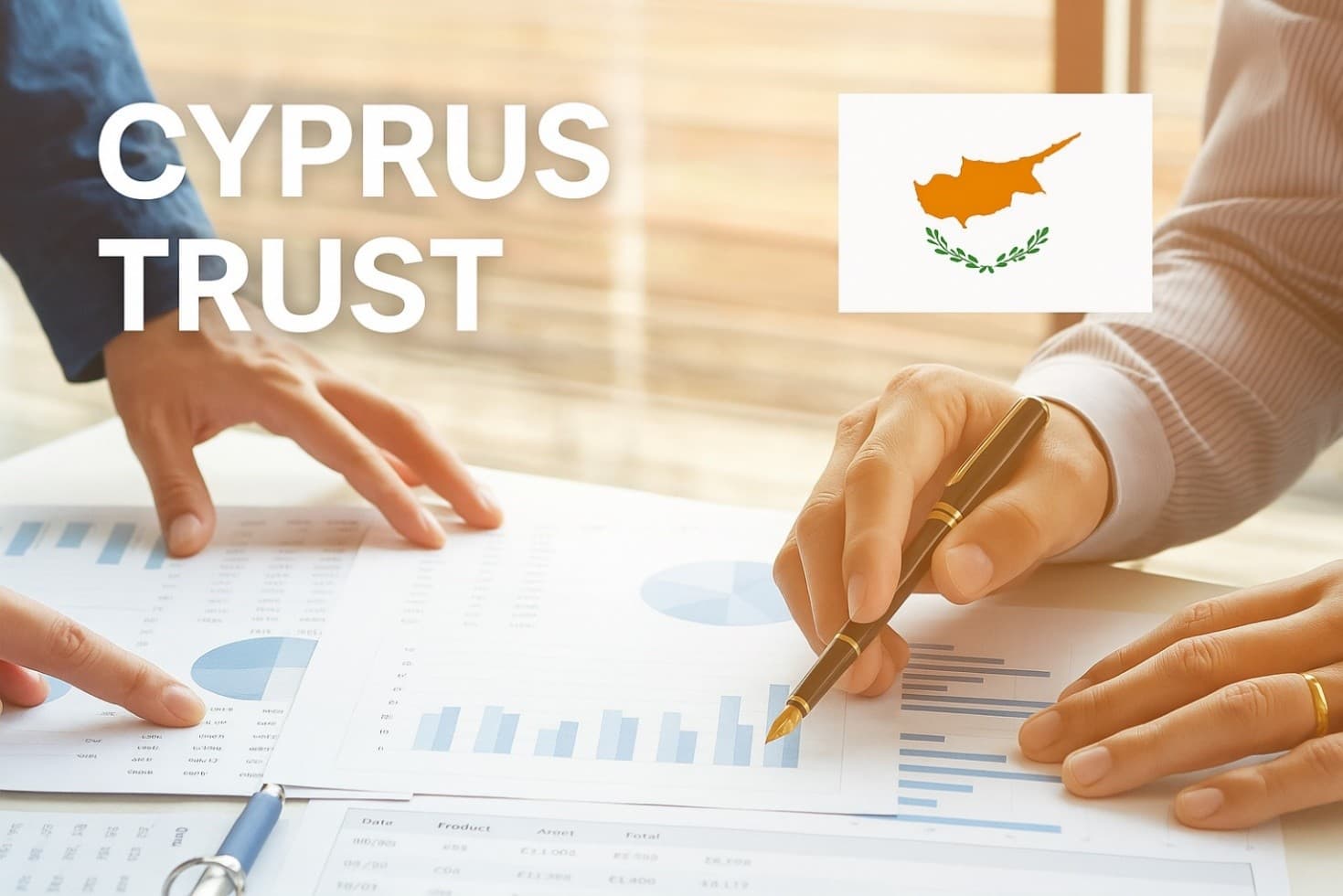Trust in Cyprus: Capital Protection and Future Planning

Content
How can you reliably protect capital, manage assets wisely, and reduce tax burden? One of the most effective tools is a trust in Cyprus. Republic of Cyprus, as an international financial center, offers flexible and confidential legislation for settlors and beneficiaries. A trust in Cyprus is ideal for:
- asset protection;
- estate planning;
- legal tax optimization;
- structuring of family and corporate capital.
What is a trust?
A trust is a legal instrument that allows the settlor to transfer assets to a trustee. The trustee is obliged to act in the interests of the beneficiaries, strictly in accordance with the terms of the trust. In essence, it is a form of fiduciary management that allows the separation of ownership rights: formally, the assets are managed by the trustee, but the benefits go to the beneficiaries.
Cypriot trust used both by individuals to preserve family wealth and by international investors to structure businesses and manage real estate.
What assets can be transferred to a Cypriot trust?
The settlor may transfer almost any property into a trust, including:
- funds;
- company shares and stocks;
- real estate;
- securities;
- works of art, family valuables, and other assets.
This makes a Cypriot trust a universal tool for international investors and families.
Advantages of a Cypriot trust
- Asset protection from lawsuits and creditors. Assets transferred into a trust no longer belong directly to the settlor but are managed by the trustee in the interests of the beneficiaries.
- Confidentiality of information about settlors and beneficiaries. All information is kept by the trustee and may only be disclosed upon request of state authorities.
- International structuring. For owners of assets in several countries, a Cypriot trust allows centralized management without unnecessary publicity.
- Tax optimization and avoidance of double taxation. For example, foreign income received by the trust is not subject to taxation in Cyprus under certain conditions.
- Flexibility in capital management and pre-defined rules for the use of assets. The settlor can set specific rules for the use of assets, for example, restricting capital use only for education, healthcare, or family maintenance.
- Simplification of inheritance in international structures. If the settlor has property in several countries, heirs would otherwise face lengthy and complex procedures in each of them. A Cypriot trust allows consolidation of assets into a single structure.
Registration and confidentiality of a Cypriot trust
One of the main features of a Cypriot trust is its special registration procedure and high level of confidentiality. Unlike companies, where information about owners and directors is publicly available in registries, a trust in Cyprus is not subject to mandatory public registration.
- No mandatory register. The law does not require entering data about the trust into state databases.
- Recording in the trustee. All conditions are kept by the trustee, who maintains the documentation and stores the trust deed.
- Internal reporting. The trustee documents the distribution of income and transactions with assets.
- Access only upon official request. Information can be disclosed only by court order or as part of an investigation.
For many entrepreneurs and individuals, the high level of confidentiality is the decisive factor in choosing Cyprus as a jurisdiction for establishing a trust.
What is important to know about a trust in Cyprus:
The creation and administration of a Cypriot trust involve several legal and organizational aspects that must be taken into account by settlors. The legal framework of Cypriot international trusts is based on The International Trusts Law of Cyprus (Law 69(I)/1992, as amended in 2012).
- Trustee qualification. Not every individual can act as a trustee. This requires special knowledge, experience, and compliance with international standards. Feod Group provides fully licensed trustee services.
- Compliance with legislation. Despite the high level of confidentiality, a Cypriot trust must comply with the laws of Cyprus and the EU. This means the trustee is obliged to verify the source of funds and maintain internal reporting.
- Restrictions for settlors. The settlor must not retain full control over the assets transferred to the trust. If absolute rights of disposal are retained, the trust may be deemed invalid. Therefore, it is important to correctly draft the trust deed.

Effective structure: trust + Cypriot company
In practice, a trust is rarely used as a standalone tool. More often, it is combined with a Cypriot company. Such a combination allows one to merge advantages: on one hand, the company serves as a legal entity through which assets are acquired; on the other, the trust sets the rules for their use and distribution.
Example of a basic structure:
- The investor (settlor of the trust) transfers funds to the account of a Cypriot company.
- The company acquires real estate or other assets.
- The real estate/assets are transferred into the trust, where the trustee establishes the rules for their use.
- Rental income or sales proceeds are distributed among beneficiaries according to the terms of the trust.
Thus, the “Cypriot company + trust” structure reduces the tax burden, protects assets from legal and financial risks, and simplifies inheritance in international structures.
Examples of using a Cypriot trust
1. Asset protection for an entrepreneur.
The client’s business was linked to international contracts, and he feared lawsuits. By transferring part of his capital into a trust, he secured his real estate and investment portfolio. Now even in business disputes, the family’s assets remain protected.
2. Estate planning.
Olga’s family established a trust for her children. She wanted the capital to be used only for education and healthcare until they reach adulthood. At 21, the heirs will receive the main capital. This gave Olga confidence that the money would not be spent prematurely. This model is relevant for families with children who want to set inheritance and targeted capital-use rules in advance.
3. Management of international real estate.
Investor Sergey owned real estate in three countries. To spare his heirs from going through complicated procedures in each jurisdiction, he created a Cypriot trust. Now all his properties are consolidated, and the inheritance process is simplified. At the same time, the trust reduced his tax burden. This option suits international investors with real estate or businesses in several countries.
4. Income optimization for an IT specialist.
IT specialist Alexander received income from different countries. With the help of a trust, he structured his income, and through a Cypriot company he began investing in real estate. Thanks to the trust, he avoided double taxation and ensured protection of his savings.
5. Charitable purposes.
Anna purchased a villa in Limassol through a Cypriot company and transferred it into a trust. The company rents out the property, and the income is distributed according to the established rules: part to her children, part to charitable projects. Thus, the capital use was predetermined in advance.
A Cypriot trust is a modern tool for asset protection, estate planning, and legal tax optimization. With it, one can plan the future of the family and business in advance.
Feod Group services
Feod Group provides a full range of services for the creation and administration of Cypriot trusts for individuals, families, and international companies. We help clients not only to properly set up a trust but also to integrate it into an overall strategy of asset protection and management:
- consultations on structure selection;
- preparation of necessary documents;
- appointment of a licensed trustee;
- creation of new legal entities and provision of ready-made companies with bank accounts;
- support for real estate purchase and sale transactions;
- tax optimization, obtaining Non-Dom status, acquiring tax residency under the 60-day rule;
- support for clients in obtaining temporary and permanent residence permits in Cyprus.
With us you receive full turnkey support!
We will be happy to welcome you at our Feod Group office in Larnaca!
Book a consultation
FAQ
Can the terms of a Cypriot trust be changed?
Yes, in most cases the settlor may provide for the possibility of changing terms or replacing beneficiaries.
Is property in a trust subject to taxation?
Taxation depends on the structure: with the right combination of a trust and a Cypriot company, tax burden can be significantly reduced.
Can a trust be used to transfer business to children?
Yes, a trust allows one to set rules for business transfer, eliminating the risk of premature or improper disposal of assets.
Contact us
For enquiries please fill in the form below. Our consultants will contact you with the details.
Griva Digeni 49, Chrystalla Court 1st Floor Office 11, 6036 Larnaca, Cyprus
11B Lyuteranska St., off. 23, 01024
